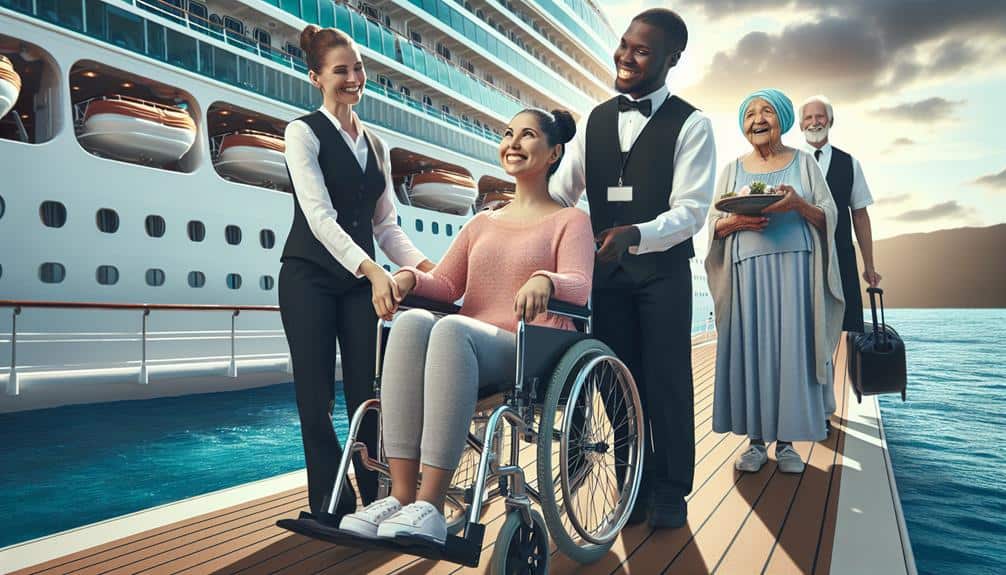Set sail on your cruise confidently with these vital accessibility tips: Guarantee wheelchair accessibility with ramps and spacious elevators. Opt for cabins with layouts accommodating wheelchairs, grab bars, and roll-in showers. Familiarize yourself with the Assistance Animals Policy for well-trained service animals. Get to know the medical facilities onboard and bring necessary prescriptions. Seek out sign language interpreters for improved communication. Choose accessible shore excursions and activities tailored to different mobility levels. Communicate effectively with staff for personalized assistance. These tips will ensure your cruise experience is smooth and enjoyable.
Key Points
- Prioritize wheelchair accessibility with ramps and spacious elevators.
- Choose cabins with features like wider doorways and grab bars.
- Understand and comply with service animal policies.
- Ensure necessary documentation for boarding with service animals.
- Communicate accommodation needs in advance for a seamless experience.
Wheelchair Accessibility
Ensuring wheelchair accessibility on a cruise ship is essential for providing a seamless and comfortable experience for disabled passengers. Accessible ramps play a crucial role in granting wheelchair users the freedom to move around the ship independently. These ramps are strategically placed at key locations, such as boarding areas, dining venues, and entertainment spaces, allowing for easy navigation without encountering obstacles.
Moreover, elevator availability is a vital aspect of wheelchair accessibility on a cruise ship. Elevators are essential for passengers with mobility challenges to access different decks of the ship efficiently. It's important for cruise lines to ensure that elevators are spacious enough to accommodate wheelchairs comfortably and have clear signage for ease of use.
Accessible Cabins
Accessible cabins onboard a cruise ship are designed to meet the specific needs of disabled passengers, providing a comfortable and inclusive accommodation experience. The cabin layout in accessible cabins is carefully planned to offer ample space for maneuvering a wheelchair or mobility device. You'll find wider doorways, lower countertops, and strategically placed grab bars for added convenience and safety. These cabins often feature a layout that allows for easy navigation around the room, guaranteeing a hassle-free stay.
Furthermore, bathroom features in accessible cabins are tailored to enhance comfort and accessibility. You can expect roll-in showers with seating, grab bars, and handheld showerheads for ease of use. The sink and toilet are typically at a suitable height, and there's usually additional space to maneuver comfortably. These considerate design elements aim to provide a seamless experience for disabled passengers, enabling them to relax and enjoy their cruise without limitations. When booking your cruise, don't hesitate to inquire about the specific features of accessible cabins to ensure a comfortable and enjoyable stay.
Assistance Animals Policy
If you intend to bring a service animal onboard a cruise, make sure you're aware of the specific requirements for these companions.
Remember to have all necessary documentation readily available to present to the cruise staff upon boarding.
Additionally, inquire about the accommodations available for your assistance animal to guarantee a comfortable and enjoyable trip for both of you.
Service Animal Requirements
When bringing a service animal on a cruise, it's essential to be familiar with the specific requirements outlined in the Assistance Animals Policy. Here are some key points to think about:
- Emotional Support Animals (ESAs) Regulations: Understand the cruise line's policies regarding emotional support animals to guarantee compliance and a smooth experience for both you and your furry companion.
- Service Dog Etiquette and Training: Make sure your service dog is well-trained and behaves appropriately in public settings, including the cruise ship environment, to ensure the comfort and safety of everyone on board.
- Accommodation Needs: Communicate any specific accommodation needs or requests related to your service animal to the cruise line in advance to facilitate a seamless experience during your trip.
Documentation Needed Onboard
To guarantee a smooth experience for you and your service animal onboard, familiarize yourself with the specific documentation required as per the Assistance Animals Policy. Most cruise lines typically require medical certifications for service animals, verifying their training and health status. Make sure you have these documents readily available to present upon boarding.
Additionally, it's recommended to check whether your travel insurance covers any incidents involving your service animal during the cruise. Understanding the cruise line's Assistance Animals Policy and having the necessary medical certifications and travel insurance in place will help streamline the process and ensure a hassle-free experience for both you and your service animal onboard.
Your readiness will contribute to a more enjoyable and stress-free cruise journey.
Accommodations for Animals
For a smooth experience with your service animal onboard, make sure you understand and comply with the cruise line's Assistance Animals Policy regarding accommodations.
When it comes to pet-friendly accommodations on a cruise, here are some key points to keep in mind:
- Review Policy: Familiarize yourself with the cruise line's policy on assistance animals, including any required documentation or specific guidelines for bringing your therapy animal onboard.
- Communicate Early: Inform the cruise line in advance about your assistance animal to guarantee they can make necessary arrangements and provide you with the best possible accommodations.
- Access Areas: Understand where your service animal is permitted on the ship to plan your activities and movements accordingly, ensuring a seamless experience for both you and your furry companion.
Medical Facilities Onboard
Consider the available medical facilities onboard to ensure your health needs are met while enjoying your cruise. Cruise ships are equipped to handle various medical emergencies. Onboard medical centers are staffed with trained professionals ready to provide emergency care. These facilities can assist with minor injuries, illnesses, and even more serious medical situations.
Additionally, many cruise ships have onboard pharmacies where you can purchase common medications and medical supplies. It's crucial to check what medications are available onboard, particularly if you require specific prescriptions. Make sure to bring an ample supply of your medications to last the duration of the cruise to avoid any disruptions in your treatment plan.
While cruise ships aim to provide quality medical care, it's advisable to have travel insurance that covers medical emergencies. This extra precaution can offer peace of mind knowing that you have financial protection in case of unexpected medical situations. Remember to familiarize yourself with the location of the medical facilities upon boarding, so you can quickly access them if needed.
Sign Language Interpreters
Guarantee that cruise ships provide sign language interpreters to aid deaf passengers in communication effectively during their voyage. Ensuring the availability of skilled interpreters can greatly enhance the overall experience for deaf individuals onboard.
Here are three key points to bear in mind:
- Interpreter Training: Cruise lines should invest in interpreter training programs to make sure that the staff providing this service are highly proficient in both sign language and the nuances of deaf communication. Quality training will lead to smoother interactions and a more inclusive environment for all passengers.
- Deaf Community Outreach: Engaging with the deaf community to understand their specific needs and preferences is essential. By soliciting feedback and actively involving deaf individuals in the planning process, cruise lines can tailor their interpreter services to better meet the diverse requirements of their deaf passengers.
- Continuous Improvement: Implementing feedback mechanisms and conducting regular reviews of interpreter services can help cruise lines identify areas for enhancement. Ongoing enhancement efforts demonstrate a commitment to accessibility and inclusivity for all passengers, including those who are deaf or hard of hearing.
Accessible Shore Excursions
As you explore ways to enhance the cruise experience for disabled passengers, let's now focus on the accessibility of shore excursions. When planning your shore excursions, look for inclusive activities that cater to different mobility levels. Opt for excursions that offer wheelchair-accessible transportation options or have the flexibility to accommodate various needs. Many cruise lines work with tour operators to provide accessible tours, ensuring that everyone can enjoy the destinations.
Inclusive activities can range from scenic bus tours with wheelchair lifts to guided city walks that are navigable for those with mobility aids. Make sure to inquire about the level of accessibility of each activity to choose the ones that best suit your requirements. Additionally, consider booking private tours that can be tailored to your specific needs and pace. Communication with the tour operators beforehand is key to ensuring a smooth and enjoyable experience. By selecting excursions with suitable transportation options and activities, you can make the most of your time ashore while ensuring a comfortable and memorable journey.
Communication With Staff
To guarantee a seamless experience during your cruise, engaging in transparent and open communication with the staff is essential. When it comes to interacting with the cruise staff as a disabled passenger, here are three key points to keep in mind:
- Staff Training: Make sure that the cruise line has trained their staff adequately on how to assist passengers with disabilities. This includes understanding different mobility aids, communication methods, and specific needs that may arise.
- Communication Tools: Familiarize yourself with the communication tools available on the cruise ship. Whether it's using special apps, text messaging services, or specific devices, knowing how to communicate your needs effectively will enhance your overall experience.
- Personalized Assistance: Don't hesitate to request personalized assistance from the staff. They're there to help make your cruise as enjoyable as possible, so feel empowered to ask for any accommodations or support you may require during your journey.
Frequently Asked Questions
Are There Any Specific Dietary Accommodations Available for Disabled Cruise Passengers With Food Allergies or Restrictions?
If you have food allergies or restrictions, most cruise lines offer dietary accommodations. You can request special menu options tailored to your needs. Make sure to inform the staff about your allergies or special requests in advance.
Can Disabled Cruise Passengers Bring Their Own Mobility Scooters or Wheelchairs Onboard?
You absolutely can bring your own mobility scooters or wheelchairs onboard. However, if you prefer not to, most cruise lines offer mobility equipment rentals to meet your accessibility requirements. It's always best to check with your specific cruise provider for details.
How Can Disabled Passengers Access the Ship's Pools and Other Recreational Facilities?
To access the ship's pools and recreational facilities safely, disabled passengers can request assistance from crew members. They will help you navigate ramps, provide pool lifts if needed, and make sure you have a comfortable and enjoyable experience.
Are There Any Specific Protocols in Place for Emergency Evacuations for Disabled Passengers?
When it comes to emergency evacuations for disabled passengers, cruise ships have specific safety protocols in place. Safety precautions are carefully crafted to guarantee all passengers, including those with disabilities, can be securely evacuated in case of an emergency.
What Types of Entertainment and Activities Are Available Onboard for Disabled Passengers?
When cruising, enjoy a range of activities tailored for you. Participate in adaptive sports or join accessible excursions. Onboard, find entertainment like live shows, movies, and themed parties accessible to all passengers, ensuring a memorable experience.




